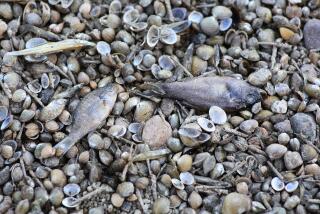Few Firms Credit Contributions : Kern County Just Wants a Little Respect
BAKERSFIELD — Kern County knows what comedian Rodney Dangerfield means when he says, “I don’t get no respect.” Los Angeles’ sprawling neighbor to the north feels that it doesn’t get the respect it deserves as the nation’s third-largest agricultural producer.
The trouble seems to be that the fertile county has, almost literally, been hiding its light under a bushel by selling its potatoes, carrots and a slew of other crops to companies that market it under their own labels--with nary a mention as to the origin of the contents.
Wine, mostly French Colombard and Chenin Blanc, has been a minor exception--but growing ever more minor.
Giumarra Vineyards continues to produce table wine produced and bottled in Edison in Kern County. Until recently, so did Lamont Vineyards. But Lamont has been acquired by Anheuser-Busch Co. to produce white wine for blending in its Dewey Stevens line of coolers. No mention of Kern County there.
If one thinks about Kern County at all, the image is likely to be one of oil derricks and cotton fields glimpsed as one speeds along U.S. 99 or Interstate 5, acknowledged the county’s agricultural commissioner, Robert A. Edwards, as he helped guide a busload of out-of-county visitors through the Arvin area. The annual tour was a program to improve the county’s economic image and boost development in the county, hard hit by recent slumps in both oil and agriculture.
But, Edwards pointed out, grapes last year, for the first time, displaced cotton as the county’s leading crop.
Also out of image is the fact that the county is one of the nation’s leading suppliers of rose bushes.
In all, Kern County produces some 95 separate crops valued last year at $1.4 billion. It ranks third in California behind No. 1 Fresno and No. 2 Tulare to the north--all three of which lead the nation in annual crop value.
Carrots were being harvested as the bus approached 2-year-old Grimmway Frozen Foods in Arvin, the county’s first frozen-food processing plant. Hodge Black of the University of California Co-operative called the plant a “harbinger” of what he predicted would be further attempts to move processing closer to the fields to improve freshness, reduce costs and, not incidentally, hang on to some of the price value added through processing.
“But,” he added, “you’d never know that these carrots came from Kern. Again we might say that our carrots come out under some of the finest labels!” In this case, the labels include those put out by Campbell Soup Co. and others.
At the nearby Cal-Arvin Farms potato-packing plant, the problem of recognition seemed to stem more from the preponderance of advertising of potatoes from Idaho and Oregon, said Bill Rommel, the company’s secretary-treasurer and self-described “office mangler.”
While some fresh potatoes are packaged in bags labeled “Arvin, Kern County,” a lot more are retailed with no indication of origin. Yet, Rommel insisted, Kern County potatoes are something special--for one thing, fresher than the cold-storage spuds from up north.
“We say that if you buy an Idaho potato in May or June,” he said, “you’re getting a tired potato.” But, he conceded, consumers might be hard pressed to know whether the potato was “tired” or not because the point of origin is rarely indicated on bulk potatoes sold in supermarkets.
Kern County’s potatoes, which come in from the hot fields at temperatures of up to 90 degrees, are cooled to about 45 degrees before grading, packing and shipping. (They even pass through a new “heart-scanner” that detects hollow centers in potatoes--unacceptable in the fresh market. While the hollowness, which occurs when heat causes explosive growth, has no effect on flavor or nutrition, he said, “The public’s not ready to accept a potato with a hole in it.”)
The bus moved back toward the county seat of Bakersfield, passing an orange orchard with an oil pump in its midst. “That’s the type of farming we really like in Kern County,” said Edwards, “citrus and oil.”
Then he noted that the pump remained still--a reminder of the hard times that the county’s huge petroleum sector continues to experience.
On the southwestern edge of the county seat of Bakersfield, Edwards and Black guided the bus through the construction site of what will be the world’s second-largest ice-cream plant (after one in London) when Los Angeles-based Carnation opens it next May. (Carnation doesn’t mention Kern on its packages, either.)
A few minutes later, at Carnation’s 40-year-old plant on Business 99 in town, the managers boasted of the quality of their cottage cheese, showing off a case of gold medals from the Los Angeles County Fair. Only local milk is used in producing it--some 200,000 pounds of it a day, they said.
But look in vain for Kern County. And the ice-cream products packaged there under a variety of labels, including Nestles, is equally discreet.
Kern County’s Top Crops in 1986
In millions of dollars
Grapes $222.9 Cotton / cottonseed 208.1 Almonds 166.6 Citrus 101.8 Potatoes 83.3 Carrots 78.2 Nursey Products 63.1 Hay / Alfalfa 60.6 Pistachio Nuts 53.9 Plums 46.5 Total all Corps 1,085.0
Source: Kern Couny Agricultural Crop Report
More to Read
Inside the business of entertainment
The Wide Shot brings you news, analysis and insights on everything from streaming wars to production — and what it all means for the future.
You may occasionally receive promotional content from the Los Angeles Times.










